
The first signs of measles develop within 10 days of contracting the disease. These can consist of: cold-like symptoms like a runny nose, cold sweats, coughing and a fever. A rash, often reddish with small bumps, is also common. Some children experience the appearance of blisters or sores which can be very painful and sometimes itch too much.
The cold-like symptoms of measles include nausea and vomiting. These are common in children and may last for several days, depending on the amount of virus that was ingested. A fever can occur up to 40 degrees above normal but is generally a sign of more serious conditions.
Other signs and symptoms include a cough that can become hoarse. Swelling of the face and throat is common in children who are experiencing this illness. This can be accompanied by a fever, diarrhea and vomiting. In some cases, there will be red, irritated eyes that can be very sensitive to light.
It is important to make sure that your child's parents are immunized to prevent the spread of this disease. There are several different strains of measles that could be circulating. You should make sure that if your child has a fever that it is not caused by any kind of illness that he may have. Make sure your child is not ill with anything if there is a fever.
A child who has any of these signs of measles should be seen immediately by a doctor for proper treatment. You should also learn about the available medical treatments for the measles virus before your child gets the disease. If you or your child has measles, you need to go to the nearest hospital. If you don't get proper hospital treatment, the infection can be passed on to other people. You should also make sure that your child wears a face mask whenever they are in direct sunlight for extended periods of time.
Measles is a highly contagious virus and should not be taken lightly. Anyone who comes into contact with an infected person can become infected. The virus is spread from person to person by coughing, sneezing, or touching contaminated objects.
The virus is easily transmitted by sharing clothing or toys with an infected person
There is no measles vaccine to protect adults and children from the disease. If you or your child have any symptoms, it is important to get a dose of measles vaccine as soon as possible. Measles is extremely contagious, so be careful not to pass any items containing the virus to anyone else, or you could pass the disease on to your children. If you suspect that you or your child may have been exposed to the virus, seek immediate medical attention.
If you think you may have been infected with the virus, see your doctor immediately. Be sure to tell your doctor if you experience any unusual or strange symptoms. Get medical attention and keep all other symptoms under control. With the correct diagnosis, you can be cured of measles.
The measles virus is a viral disease that causes small red bumps or a rash on the cheeks, forehead and lips. People who contract measles will typically experience one or more of the following symptoms. If left untreated, people who have been diagnosed with measles will experience fever, nausea, vomiting and diarrhea. These symptoms may be accompanied by swelling of the lymph nodes.
If left untreated, measles may lead to pneumonia, encephalitis and even death. If you or your child has these symptoms, it is important that you stay home to avoid spreading the disease to others. If you or your child is hospitalized, make sure to contact a doctor so that they know exactly what they are treating.
Small red spots that occur on the hands and feet or around the mouth may look very similar to chicken pox. Although they may seem like chicken pox, there are many times when you may be having a case of measles.
Do not delay getting the measles vaccine if you think you or your child may have been exposed to the virus. It is not a laughing matter and it could affect your life. If you or your child is vaccinated, it is very important to get the measles vaccine as soon as possible.